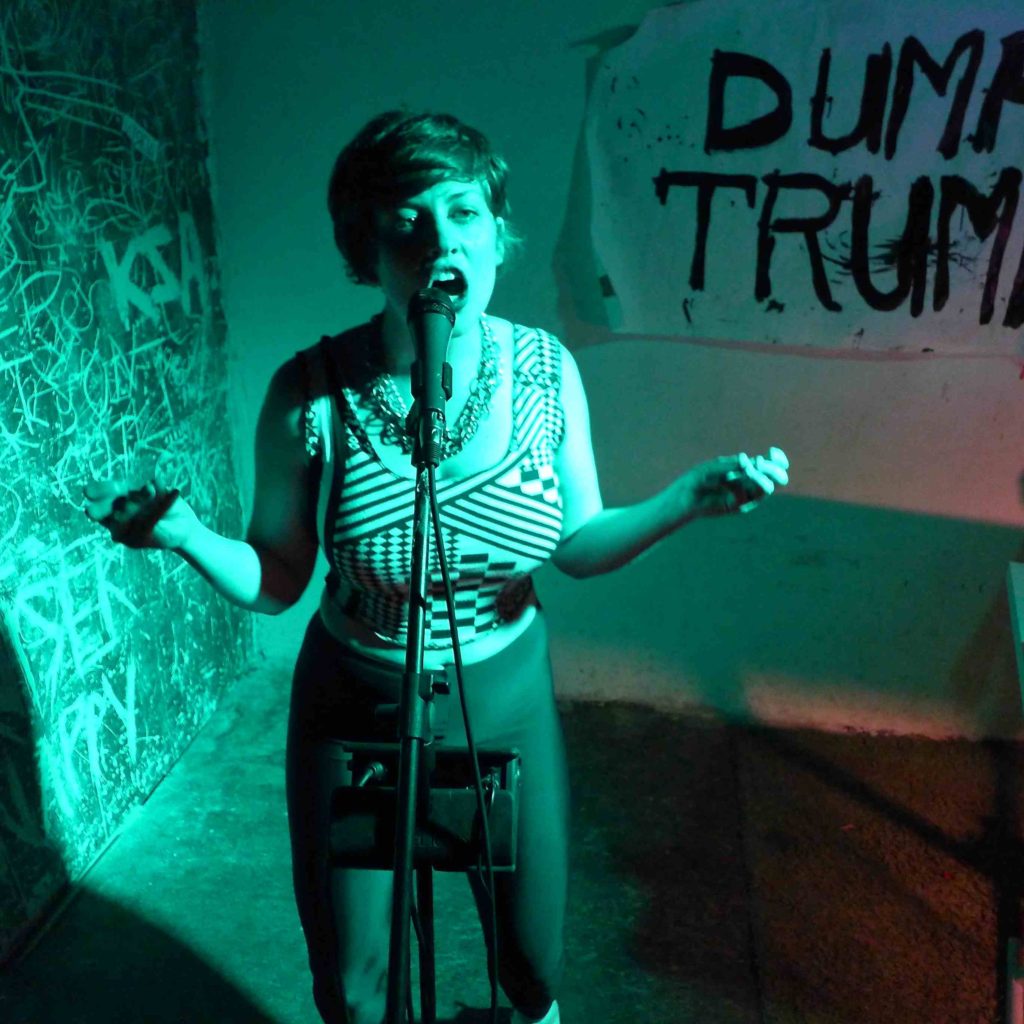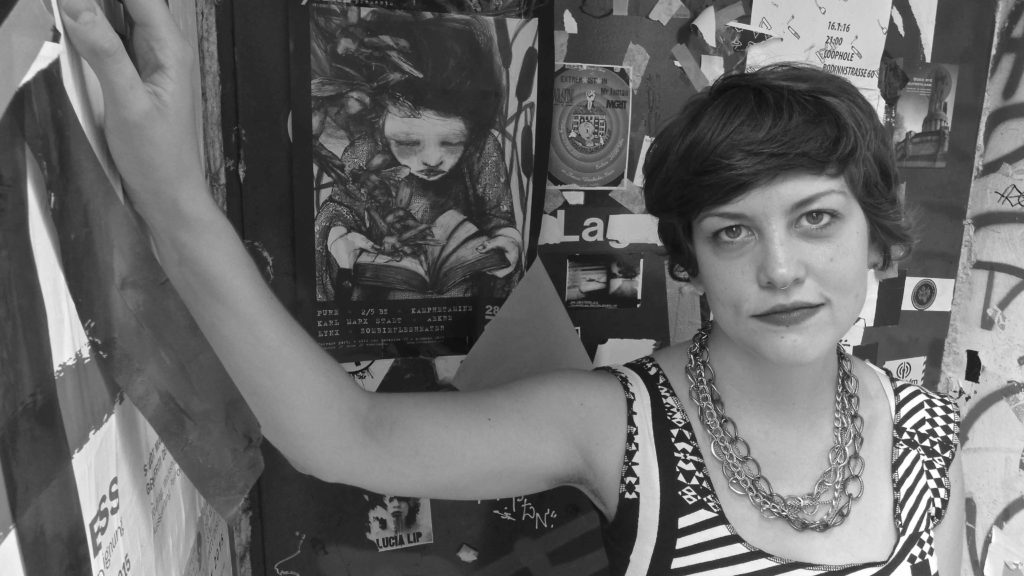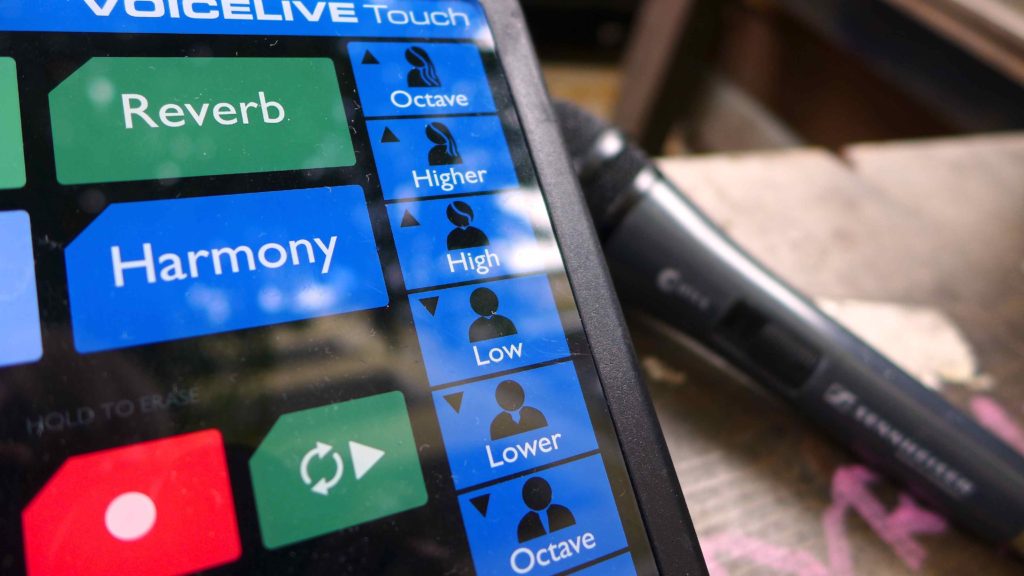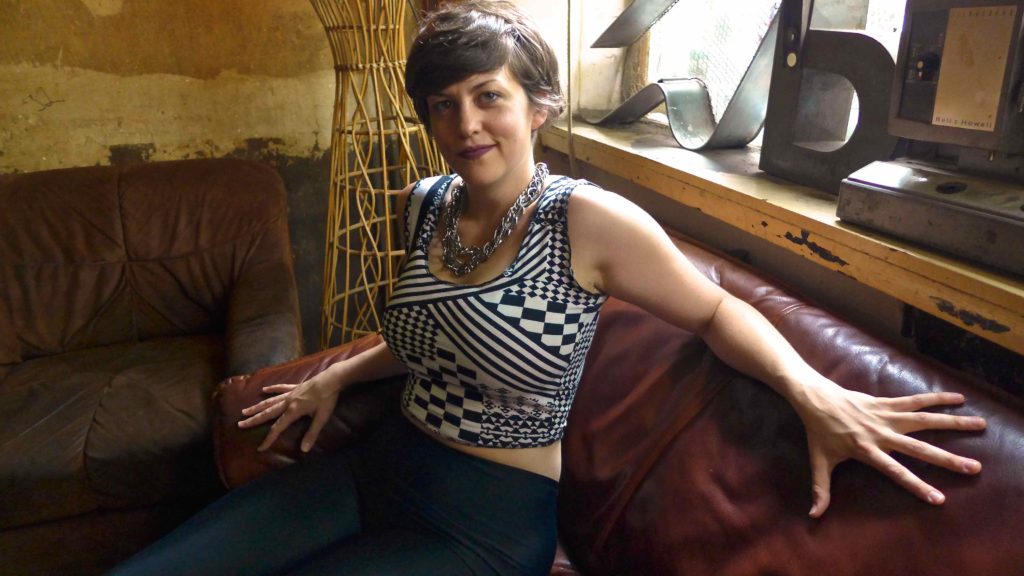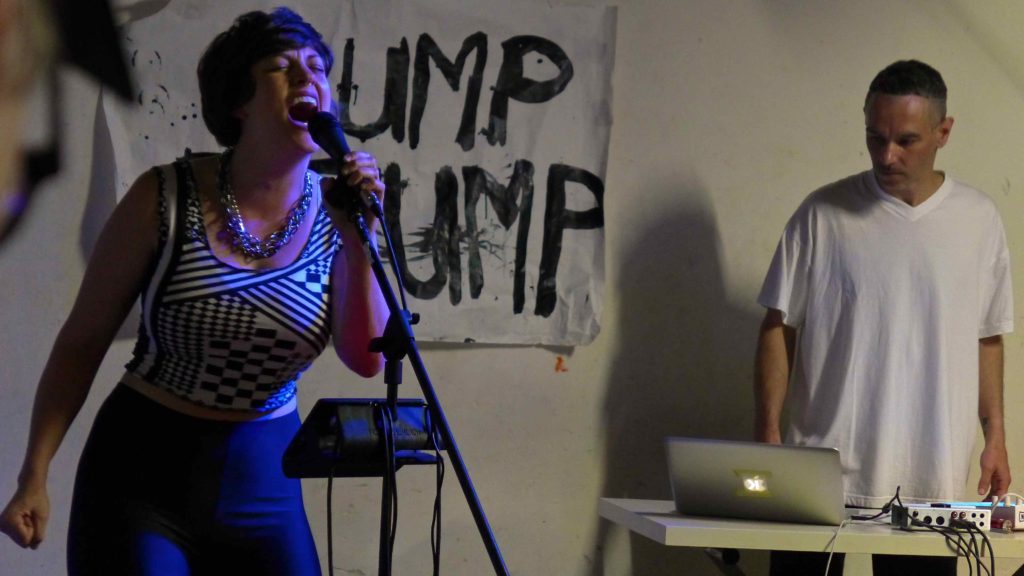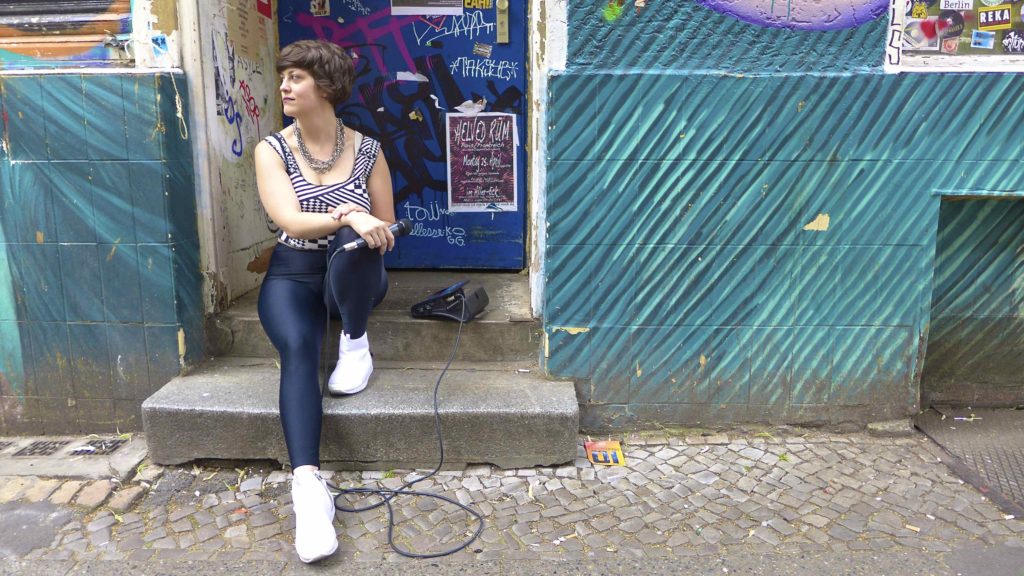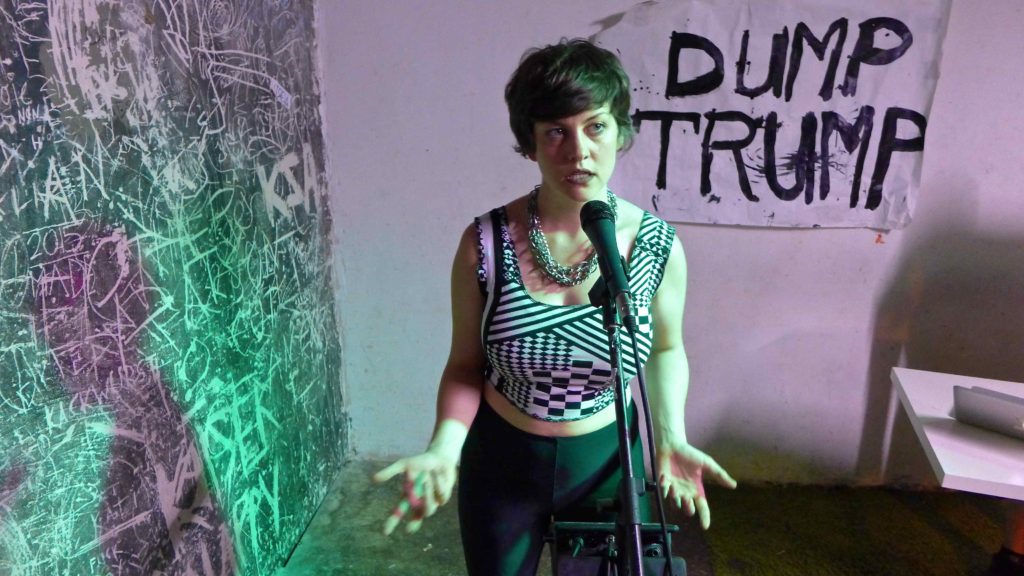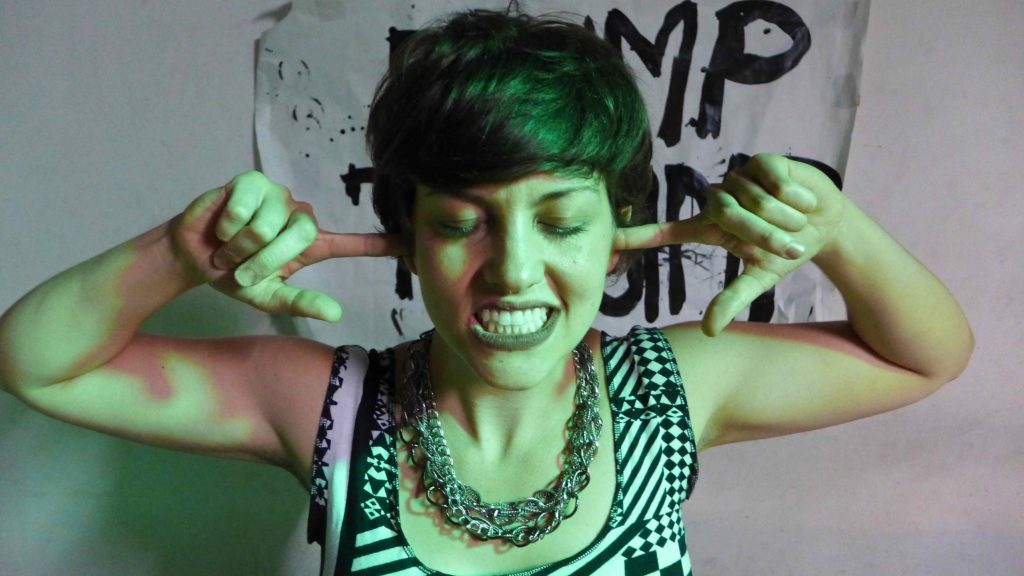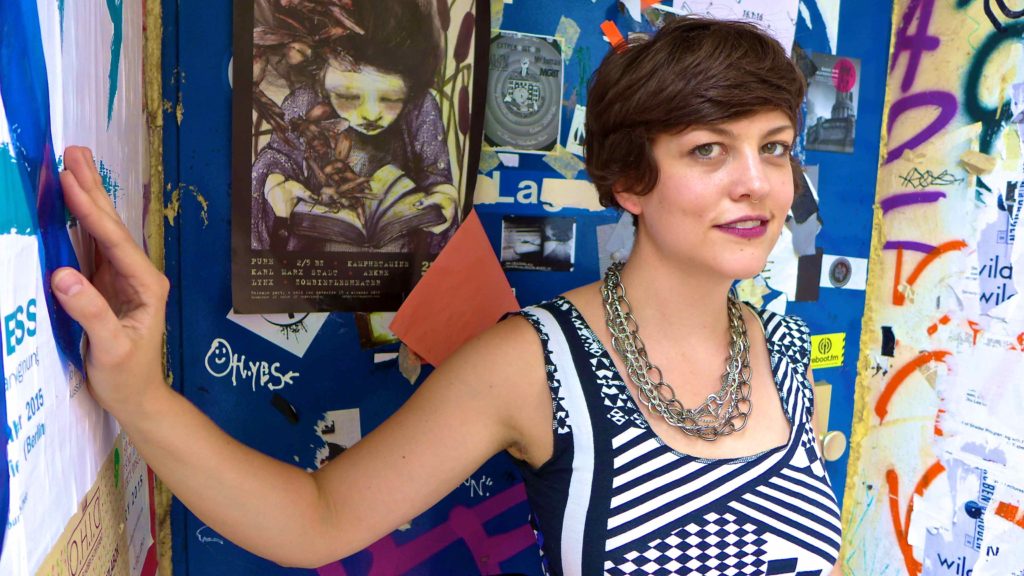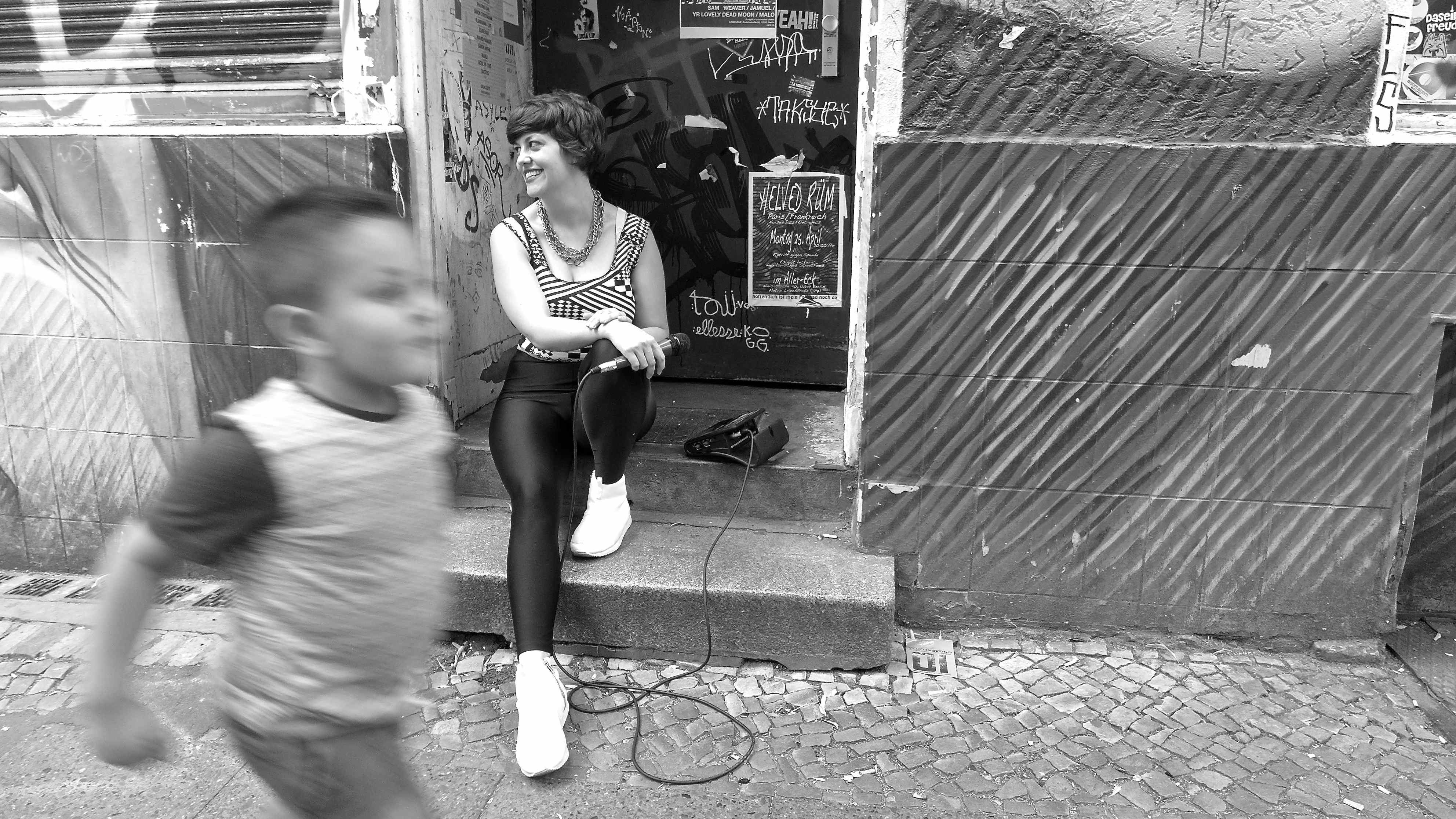
You could say that Tatyana Krimgold is the perfect Wahlberliner…
A writer, singer, acoustic musician, electronic music maker, yoga teacher, event producer and occasional stand up comedian, Tatyana is one of those adventurous ‘creatures’ for which Western Europe’s “poor but sexy” artist colony is so famous. Its eclectic, creative ‘bio-dome’ atmosphere has been attracting artists for well over a century, with no sign of letting up in spite of looming takeover bids by opportunistic entrepreneurs and residential gentrification.
As a musician, part of Tatyana’s creative practice is to allow herself to dare greatly: to move outside of her comfort zone whilst applying the “structures” she’s studied and learned across the years. Unafraid to play, discover and experiment with her music, she also harnesses the energy of audiences inside her spirited performances and collaborations.
On stage she is magnetic.
Originally hailing from Washington, DC, Berlin called her from across the waves. She’s been inching her way towards the “City Of Dreams” since catching the travel bug in her formative years.
This year she and Berlin celebrate their four year anniversary together: it’s a very happy union.
While her music can be fierce her personality is not: Tatyana has a gentle countenance and a wicked sense of humour, which she puts to good use in both her stand up and music – especially as “Krimgold“, her recent foray into electropunk with talented Berlin-based Canadian producer, John Warkentin (ADHD|Zen).
Meeting “on craiglslist” last October after Tatyana put out a call for a music collaborator, she says “John responded to an ad of mine… and I was excited because his stuff sounded really good.. We met weekly and chatted and he… came in with some nice ideas.” (Oh – and music software program Die Maschine – key to their sound.)
In Berlin, I’ve seen Tatyana perform twice: firstly with an acoustic solo set brimming with intense, lyrical guitar songs, and then at tiny, iconic club, Loophole.
The latter was a spirited soundcheck for a Krimgold electropunk gig. Standing on a bare bones stage in what could pass for a micro-version of CBGB (every inch of its walls inked in funny or provocative graffiti, the best being “Dump Trump”), Tatyana playfully wailed and railed over John’s sexy, inventive beats and melodies.
Not only did they have great PRESENCE, they sounded GREAT. (Their polite, adept Berliner sound engineer thought so too.)
Krimgold was seductive, spectacular and urgent in the way only punk and electrona can be. As she hypnotically wound her way around each note, I realised I’d lucked into what could only be described as a sonic lap-dance from the love children of Nina Hagen, The Slits, Trio and Chicks On Speed. It was a ‘plug in and play’ match made in heaven.
“People with soul and guts inspire me,” Tatyana says. Back at you, Ms Krimgold…
Circus Folk: Where are you from originally? And how did you make your way to Berlin?
Tayana Krimgold: I was born in Alexandria, Virginia and grew up in McLean, Virginia, both suburbs of Washington, D.C. I continued living in Virginia for college but spent summers abroad – in language programs in Costa Rica and Spain, and on trips with my family to Europe and India. So my appetite for exploring had been whetted!
Of course as part of a student group or as a vacationer, your experience is limited: I always craved more time and freedom to explore on my own, to really get to know another culture and make a way within it.
After college I moved in with my sister in New York to attend acting school. The program was great and the city was exciting. But after a few years of the NY hustle (restaurant jobs, expensive living and so much stress), I was worn out and started to wonder what else was possible – whether there was an alternate route to living as an artist. And, somewhere with a bit more air to breathe and room to think outside the box.
Meanwhile, I had heard bits and pieces about the great city of Berlin and met a Berliner (a fellow waiter at a restaurant in Brooklyn) who’d moved for his girlfriend. Smart, funny, fastidious yet laid back, he seemed unusually at peace with himself. When I asked him what he really did, he just said, “I’m a waiter,” without the typical song-and-dance about what he “should be“.
When I asked him which city was better, he matter-of-factly answered “Berlin”.
Eventually I moved from New York back to Virginia, and then to Vietnam where I’d found myself a job teaching English. Living in Vietnam was wonderful: the cost of living was low, the food was great, and with plenty of time,I began to write songs again. I’d also found a totally different world, where the stresses and sense of the US were abstracted and put into perspective. Life felt lighter and more playful.
But I was eager for a more exciting music scene. Soon enough I met and dated a traveler and musician who happened to come from Berlin. When I visited several months later, I fell for the city and have been here ever since!
CF: Do you have any family ties or heritage in Europe?
TK: My grandparents on my Dad’s side were both immigrants from Europe. My grandpa came from Russia – from what is now Ukraine. My grandma came from Holland. They met in California when my grandpa was studying, later settling on the East Coast. I believe I have some remaining relatives in Russia and Holland, but most of them live in the US now.
My Mom’s side of the family has been in the States for quite a few generations, but are apparently of Scottish and Irish descent.
CF: How long have you lived in Berlin? What do you like about the city, especially artistically?
TK: This September I’ll have been in Berlin four years.
The main benefit the city offers artists – and everyone! – is a real sense of freedom. This comes in many forms but one cornerstone is the high quality of life available to people of all incomes (including low income.) It’s inexpensive to live here and there’s lots to do that’s next-to-free, and, lots of people (thanks to Germany’s Hartz-vier!) with whom to enjoy all of this.
Making little money doesn’t make you an outcast here; you fit right in.
It’s certainly possible to work a full-time job and make art, but for me, the cheap living and thus, ability to work part-time, has been huge. For paid work I do voiceover work, teach English and yoga. With my jobs – and making and performing music – I still have some time to see a show, go out dancing or relax in the park.
Then there’s the music: before moving to Berlin I had never heard much techno! I fell completely in love with dance music and culture here – that is, that imperative to move. The complex patterns and shifting rhythms; the collaging of songs and beats and the associations that accompany them; music so precise and diverse in timbre and tone to stimulate you from head to toe… Talk about clearing your chakras! And it’s not just dance music – there’s a place and a community for all types of music, and room for deep experimentation.
Rather than scoff at ‘the weird’, Berlin embraces it and lets it thrive.
Finally, there is a wealth of opportunity to develop your craft. Though it often doesn’t pay, there are lots of places to perform and lots of open, interested crowds in Berlin. So it’s a great place to cut your teeth and grow as an artist.
There are lots of open stages for music and comedy to show your work, or work-in-progress. Rather than finding competition you find really supportive communities. There are lots of venues open to new performers and also to hosting events or regular shows.
CF: You’ve travelled a lot: what fuels your “wanderlust”?
TK: [Travelling] shakes up your world and helps you take culture, society, all apparent ‘normalcy’ and your identity, with a grain of salt.
For a while I was pretty horrified of losing my “home” or having to choose between homes, my home here or the one in the States. Now I feel that the quality of my relationships – with loved ones and myself – is what home is. Breathing and relaxing takes me ‘home’.
CF: What is your ‘music story’ and when did music first enter your awareness as a ‘vocation’?
TK: Now I play guitar, use a vocal loop station, and am starting to produce with Ableton (it’s the most popular software for making music, pretty revolutionary actually. Nearly all electronic musicians use it.) But my first musical experience was learning to play piano.
My mother – who loved but didn’t make music – had me practicing an hour a day from age five to seven. By seven I was a great little pianist, but I couldn’t stand being trapped inside for practice and was sick of my strict teacher, Ms. Mang. I told my mom I wouldn’t play, even for a pony!
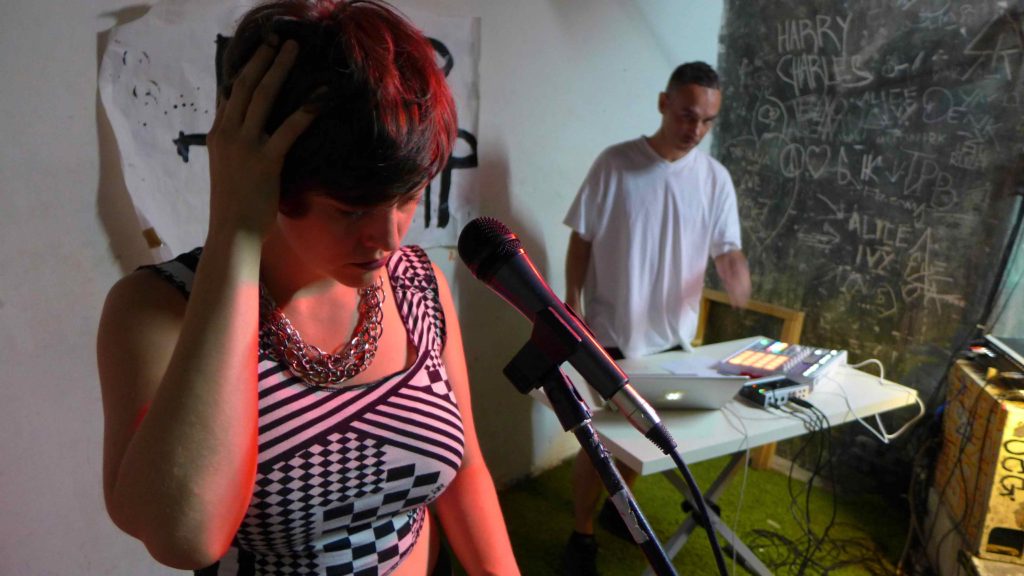
Waiting for Krimgold. Photo: Megan Spencer (c) 2016
Following piano I joined The World Children’s Choir and spent the rest of my childhood singing in concerts and operettas. I kept singing through high school and in an a cappella group in college. Only at the end of college did I return to playing an instrument, this time guitar.
That’s when I started to put songs together. Meanwhile, at the end of college, I took a class, ‘Technosonics’, which became my introduction to experimental music, from John Cage on.
I loved that too, and it started me off playing with music software and thinking experimentally…
CF: Why did you switch from piano to guitar?
TK: I can’t remember exactly what prompted it, but I was writing poetry and had the feeling I’d like to write songs. In my third year of college I had a teacher named Michael who taught me the basics. I found it quite daunting actually, and mysterious, and it hurt my fingers. As with the German [language], I wasn’t sure if learning it would happen! I remember he told me to relax my wrist; that took a while…
Putting chords together and forming songs actually came before I had any strumming technique. When I first came to Berlin I actually put the guitar away, interested only in electronic. But now I’ve found my way back to it, both as a writing tool and to perform with.
CF: And singing: you have a very powerful singing voice as well as being playful with it! Did it take you a while to find your ‘authentic’ voice?
TK: I grew up singing in choirs and have a good ear and a big range, so I was always comfortable using my voice.
I went from singing classical to pop to jazz, and learned to use it in different ways. And I’ve had a bunch of great teachers over the years. My voice teacher in acting school taught me the value of loosening up and exploring outside of normal habits. I had a great teacher here in Berlin too, who taught me to scream like a baby to warm up.
Getting a rich sound mainly has to do with the relaxing body and mind, so that the natural sound can emerge and resonate. Yoga has helped a lot with this, too.
CF: You seem to experiment a lot with your sound – from traditional bluesy and stripped back music, to more ethereal experimental and electronic music. How do you approach your singing and music – do you have a particular philosophy?
TK: On my first foray into writing music I went for very simple, traditional guitar songs. I don’t play these much anymore, but what I discovered is that a very clear emotional logic develops. I’ll try different chord combinations until I find something with emotional resonance. Then the next part of the song has to feel right, to make sense to me in the arc of the song. What I learned of theory usually aligns with my intuition.
In the early songs, after the chord structure, I went with the first melody that worked and then wrote lyrics. These days, I take a bit of a step back between the chords and the melody, playing around in all sorts of ways ‘til I find something that really interests me rather than something that just fits. This is where I feel I have to wrestle with my first sense so I can find something new, so the melody isn’t just echoing the chords but playing with them.
I do other kinds of music – including improvisation – built on a loop station. I also write top-line (lyrics + melody) in collaborations, but I always use this same principle of contrast, casting new frames or perspective on the existing sounds and sense.
I love experimentation but I think it’s been good for me to express this tendency within some traditional structures. I once made a bunch of sound collages and no one could really understand them; it’s nice when people can feel they understand at least enough to go along with you…
“Performance… creates a sacred space. Everyone in the room, with their attention, holds this space together.”
CF: What have been some of the ‘formative’ gigs you’ve played, or moments, where you have felt as a performer you have evolved further or changed you in some way?
TK: The first moment I thought of is a recent one: I was just playing an ‘open mic’ about a month ago at Lagari (live venue in NeuKölln, Berlin).
A few years ago I had been doing a lot of improvisation with a loop station but just at home, creating whole landscapes and then deleting them. I performed a few times out, but it’s hard with improv and machines at new venues because sometimes it works and sometimes it doesn’t work as well – especially with no sound check.
Anyhow, after writing a bunch of proper songs and preparing a show, a few months ago I finally let myself play with improvising again. At home it was very cool. So, I brought it out and played at an open stage. And it was a great experience! I felt as comfortable as if I were playing for myself and had a great time. And as it turned out, the audience were having as much fun! A few people talked to me afterward and told me at length about the depth and power of their experience. That was very gratifying – a big “keep going” for me!
CF: And what’s your relationship like with the audiences you play to – are they intrinsically part of your performance?
TK: I just love them and want us all to have a great time! Sometimes I want to tease or tickle them, but whatever it is, I want to engage them. It’s like a conversation: it works if best if you’re both interested.
And like a conversation it works better if you’re relaxed, not pushing or bracing, but sharing and listening. It’s also a bit like teaching – the audience will have more fun if they feel like they can trust you, that you have a plan, and know what you’re doing. Then you can take them on a ride, if you have their trust.
CF: What do you enjoy about recording – and also about performing live?
TK: I haven’t done a ton of recording but what’s nice about it is all the great ideas you can realise in the final production. And also the intimate, free atmosphere you can create to record in. I can understand why many bands go out and record at little spots out in nature, where their hearts have space to roam.
But a performance also creates a sacred space. Everyone in the room, with their attention, holds this space together, brings their energy and participates in the creation that results. It’s nice to have a recording and say, “hey, I did this,” to have something to hold on to, but it’s also great to have this experience with a group of people – a sort of secret between you and them…
CF: You’ve also studied Creative Writing, and write short stories, and keep many journals: what do you like most about the writing process?
TK: I love how you can sort it all and lay it all out – “it all” being that amorphous stuff inside you with emotional charge that’s sometimes hard to spit out, especially on the spot, to someone else, in real time.
Sometimes you can find a friend who understands your way of thinking really well – and that’s great. But more complex thoughts are hard to explain, even to people if you haven’t worked them out, at least a bit, yourself.
Writing means you have the chance to understand what you yourself have experienced, and gives others the chance to take it in, in their own time.
I also love how intimate writing is. It’s sexy that way. This alone thing you do, hoping to be caught…
CF: Who are you most influenced by in your music?
TK: My influences are very eclectic, but people with soul and guts inspire me: The Parliament, Marvin Gaye, Ottis Redding. Nirvana. Fiona Apple. Nico. John Lennon, Patti Smith. Elliot Smith. Portishead. Public Enemy.
Verdi’s La Traviata was a childhood favorite. Matthew Herbert, Arthur Russell. Depeche Mode. Kraftwerk… Great dance music, Detroit house to Berlin minimal.
I’m also inspired by all the people I love of course! And I’ll mention, too, one of my best friends, Stephen Paul Taylor, another Berlin expat musician with the Reddit hit Everybody Knows Shit’s Fucked. He’s a very warm, fun performer, and seeing him integrate his humour into the music has been an inspiration to me.
CF: you live a very rich and vibrant creative life in Berlin: what other artistic pursuits are you engaged with? And what new releases and projects can we look forward to you ‘manifesting’?!
TK: Currently there are three ‘voicings’ of Krimgold…
One is electropop/punk with live producer John Warkentin who has reimagined some songs I’ve written on guitar, and with whom I’ve collaborated on other tracks. Another is my solo improvised looping, and the other is an acoustic set.
I’d like to continue to perform and to record in all capacities. But the priority at the moment is getting out with the electropunk set, with my live producer and collaborator John on board.
Additionally, a project that will soon be underway is a monthly showcase and party, “Krimgold presents ‘The Show’ ”. I’ll be hosting and performing, followed by three to four other acts of music, comedy, and performance art, all ending in a DJ set and dance party. The venue is not yet set, but I hope to have it up by September.
Soon, I hope to have an EP of Krimgold (electronic). I’d also like to have an EP of acoustic tracks. Professional recordings are in the works!
I also teach yoga and I am getting organised to hold a weekly a restorative yoga class, the kind where you lie around for an hour. Very chilled… Otherwise I have a few other musical collaborations in the works where I will accompany others on their productions and compositions.
And I am slowly starting to cook up some stand-up bits, to do a bit of comedy again : D
Thanks to Tatyana for the interview!
- Listen: to Krimgold on Soundcloud
- Like: Krimgold on Facebook
- Watch: Krimgold live on Youtube
- Listen: to ADHD|Zen’s music on Soundcloud
- View: the entire Krimgold gallery
- Thanks: to Loophole and John Warkentin.
Tagged: berlin music, dance, electropunk, krimgold, tatyana krimgold

